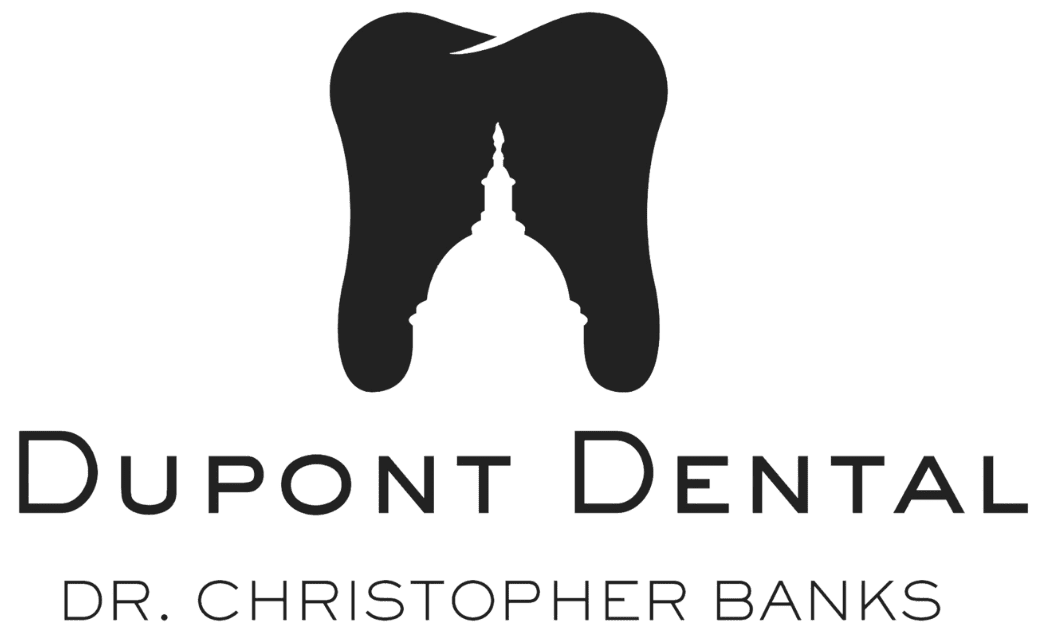Do your gums bleed when you brush your teeth? Are your gums sensitive to cold foods and drinks? You may have gingivitis. While gingivitis, or gum inflammation, is easily reversible, it can develop into a problem that can be more difficult to eliminate: gum disease. At Dupont Dental, we offer periodontal disease treatment in our Washington, DC, dental office for patients to restore gum health.
Gum disease, or periodontitis, is a common but highly damaging dental problem that requires professional care. Professional care can keep gum disease symptoms in check. Our office also offers additional restorative dentistry services in our Washington, DC, office.

Gum Disease Symptoms and Risk Factors
The most common signs of gum disease include:
- Bleeding gums
- Sensitive gums
- Bad breath
- Gum recession
- Deep gum pockets
- Loose teeth
Multiple factors can increase your risk of gum disease:
- Age
- Genetics
- Diabetes
- Heart disease
- Smoking and tobacco use
- Poor oral hygiene
If you notice these signs of gum disease and have one or more of these risk factors, please contact our office. We will perform a visual exam and take digital X-rays. Let us know about all your symptoms to help us determine the right treamtent for your stage of gum disease.
Stages of Gum Disease
The four main stages of gum disease include:
- Gingivitis: This is the only reversible “stage” of gum disease, also known as gum inflammation. When harmful bacteria begin to build on the gums, they irritate and inflame the tissue. Your gums can feel sensitive and bleed when you brush and floss.
- Mild Periodontitis: As gum inflammation becomes gum disease, your gums will begin to pull away from your teeth. This process will create bacteria-filled gum pockets. You may need regular deep gum cleanings to treat these pockets.
- Moderate Periodontitis: Deep gum pockets are common at this stage. The gum infection will break down the gum tissue further. You will also feel reoccurring gum pain and discomfort.
- Advanced Periodontitis: A lack of support from the gums means you experience loose teeth. Surgery is the most viable option to treat the teeth and gums at this stage.
Gum Disease and Your Health
When you develop gum disease, bacteria begin to inflame your gum tissue. If left untreated, this inflammation can enter the bloodstream and affect the heart. Patients who have cardiovascular disease and develop gum disease are at risk of heart attacks, stroke, and other heart issues. Diabetes is another health problem linked to gum disease. High levels of blood glucose can attract bacteria to the mouth.
Pregnant women are also more likely to experience gingivitis or gum inflammation. Hormonal changes during pregnancy can make the gums more sensitive. Dental cleanings are safe for pregnant women in the second trimester. Call our office if you notice your gums bleeding when you brush and floss. We can also provide tips on how to care for your teeth and gums at home.
Periodontal Disease Treatment in Washington, DC
You can reverse gingivitis with good daily oral care at home and regular professional dental cleanings. However, once gingivitis turns into gum disease, professional intervention is necessary to save the teeth and gums.
Gum disease treatments may include:
Scaling and Root Planing
Used in tandem, these deep cleaning treatments remove the tartar and plaque from the gums and root surfaces.
During scaling, we remove bacterial buildup from the gums and beneath the gum line. Root planing consists of smoothing the surface of the tooth roots, which can become rough when bacteria attach to them.
We can also place antibiotics in the gum pocket to help kill the harmful bacteria and prevent reinfection.Eventually, the gums heal and then reattach to the clean surfaces of your teeth.
If you have gum disease symptoms that keep coming back, we will make a schedule for you to get regular scaling and root planing treatments.
Restorative Care
If you have advanced gum disease, you can lose permanent teeth. In that case, once you are healthy enough for treatment, you can get a restoration. Dental implants are the gold standard for replacing missing teeth.
If you have a single lost tooth, we will recommend a single implant capped with a dental crown. In addition, we may also recommend bridges or dentures supported by implants.
Oral Surgery
In the most advanced cases of gum disease, you will need surgery. Some surgeries can remove the diseased gum tissue. Treatments like gum grafting can add healthy gum tissue over deep gum pockets. We will refer you to a specialist to perform gum surgery if needed.
Periodontal Disease Treatment FAQs
We welcome you to learn more about gum disease with answers to these common questions:
Does gum disease treatment hurt?
Anesthesia is common in gum disease treatments for pain-free care. However, sensitivity is common when you already have sensitive gum tissue because of an infection. You may have sensitive gum tissue after a deep cleaning, but this will fade. After you tackle gum disease, you will no longer feel gum pain or discomfort.
Will gum disease go away on its own?
No, gum disease will not stop on its own. If left untreated, gum disease will progress.
Thorough brushing and flossing can help reverse gum inflammation. However, if you develop gum disease, you need professional dental care. Scaling and root planing, restorative care, and even surgery can treat your gum disease.
Can the gums grow back naturally?
No, once your gums recede, they will not grow back. Grafting is your best option to restore healthy gums if you have gum recession. For this reason, care for your gum health at home with regular brushing and flossing. If you notice changes in your gum health, call our dentist office for professional care.
How often should I get a deep cleaning if I have gum disease?
If you have gum disease, you’ll likely need a deep cleaning (scaling and root planing) at least once every 6 to 12 months. In more severe cases, we may recommend cleanings more frequently, sometimes every 3 to 4 months, to effectively manage the disease. Regular deep cleanings are crucial to keeping your gums healthy and preventing further damage. Dr. Banks will create a personalized schedule based on your condition and monitor your progress closely.
What happens if I decide not to treat my gum disease?
Untreated gum disease worsens over time, leading to significant issues like gum recession, tooth sensitivity, infections, bone loss, and eventually tooth loss. Beyond oral health, chronic gum disease increases your risk for other serious conditions, such as heart disease and diabetes. Early intervention is essential for stopping progression and preventing these severe complications. Don’t ignore symptoms—regular dental visits and prompt treatment are vital.
Will I eventually lose my teeth with periodontal disease?
Not necessarily. Periodontal disease, if caught early and treated effectively, doesn’t have to result in tooth loss. However, untreated or advanced periodontal disease can severely damage gums and bone, eventually causing teeth to become loose and fall out. Most people can keep their natural teeth even after periodontal disease diagnosis with timely intervention, consistent oral care, and professional support.
Are electric toothbrushes better for preventing gum disease?
Electric toothbrushes are more effective at preventing gum disease than manual brushes. They remove more plaque with their consistent motion, and built-in timers ensure you brush long enough. Studies show electric toothbrushes can reduce gingivitis by about 11% more than manual brushing. The pressure sensors also help prevent the aggressive brushing that often damages gums.
Restore Your Gum Health
Are you noticing changes in your gum health? Do you experience bleeding, swollen, or red gums? Call our office for periodontal disease treatment in Washington, DC, at (202) 946-4720. You can also schedule a gum disease consultation with Dr. Banks online.
If you have more questions about your gum health, let us know at your next appointment. We’re here to help improve your health.
